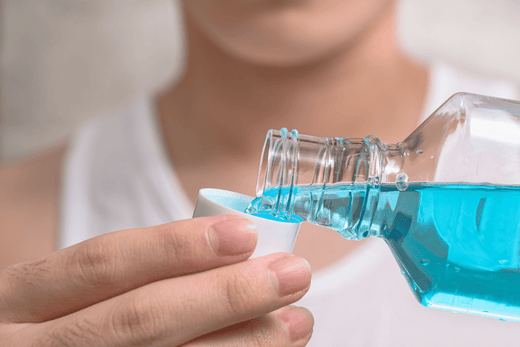
Table of contents
Oral hygiene plays a key role in the overall health and well-being of a human being. Maintaining good oral hygiene includes, brushing, flossing, and mouthwash to the routine. A good routine of oral hygiene helps keep a healthy gum and minimize risks of periodontal diseases, dental decay, cavities, and plaque buildup. Moreover, proper oral hygiene aids in sustaining the overall health of teeth, and their structure, and ensures a healthy lifespan. Mouthwash is one of the essentials when it comes to oral hygiene. In this blog, let us delve into the difference between antiseptic and antibacterial mouthwash and which is a preferred choice.
Mouthwash
Maintaining good oral hygiene involves more than just brushing and flossing. Mouthwash also known as mouth rinse is an ideal addition to ensure good oral health. Adding a mouthwash to the routine not only helps to freshen up your breath but also protects against bacteria and dental plaque. There are different types of mouthwash that cater to various oral health needs.
Advantages of a Mouthwash
By incorporating mouthwash into your routine, you can achieve the following benefits.
- Good oral hygiene by thorough mouth cleaning.
- Helps minimize bad breath and brings fresh breath.
- Lower risks of plaque buildup, stains, discoloration, and other gum diseases.
- Stronger enamel as a result of good oral hygiene.
Types of Mouthwash
Mouthwash plays an essential role in refreshing breath and escaping any dental cavities or plaque. Mouthwash is further divided into therapeutic and cosmetic types. These types of mouthwash are formulated to assist people with different dental requirements. While hunting for a mouthwash you will find labels including, antimicrobial," "antibacterial" or "antiseptic. It is important to understand these labels and choose a mouthwash that best suits your condition. Below are the two well-known therapeutic mouthwashes to help in conditions like tooth decay, plaque, or bad breath.
Antibacterial Mouthwash

Dental plaque results when bacteria colonize on the tooth surface. The bacterial growth is promoted under favorable conditions in the oral cavity. To control bacterial growth routine brushing and flossing is important. Moreover, mouthwash further helps in effective plaque control. Antibacterial mouthwash is the ideal way to inhibit the growth of bacteria.
- Helps combat the bacteria responsible for bad breath.
- Provide an additional layer of protection against dental issues.
- Some mouthwash consists of fluoride which helps to strengthen tooth enamel.
- Helps reduce post-operative risks; extractions or oral surgeries.
Antiseptic Mouthwash
Antiseptic is a type of therapeutic mouthwash consisting of active ingredients. The ingredients present in antiseptic mouthwash disrupt bacteria and help in preventing infections that result in plaque buildup and periodontitis. Unlike antibacterial mouthwash, antiseptic mouthwash also targets different spores, fungi, and viruses in addition to the inhibition of bacteria. Due to its properties, antiseptic mouthwash neutralizes the acid in the mouth which makes it an unfavourable environment for the bacteria. Following are the ingredients that are included in an antiseptic mouthwash.
- Hydrogen peroxide
- Menthol
- Eucalyptol
- Sodium chloride
- Fluoride
Following are some of the proven benefits of using antiseptic mouthwash.
- Prevents from Plaque buildup, tooth decay, and gingivitis.
- Assist in preventing a common postoperative complication after dental extractions.
- Protects from Mouth ulcers.
- Helps relieve a Xerostomia or dry mouth condition.
- Helps improve bad breath.
- Protection with Tooth staining.
Which Mouthwash should we use?
Choosing from antiseptic or an antibacterial mouthwash depends on the requirements and dental conditions of each individual. Moreover, it also includes personal preferences and health needs. Your orthodontist can best suggest the type of mouthwash depending on your dental condition. However, considering the following factors can help you in making a sound decision.
- If you are more prone to various dental infections, an antiseptic mouthwash could be a better option.
- If you are more prone to bacterial buildup or have cavities, an antibacterial is the choice for you.
- If you are looking forward to introducing a mouthwash to your daily routine, an antibacterial mouthwash could be more gentle than an antiseptic one, which works better for short-term management.
- Lastly, your orthodontist can best advise you on the type of mouthwash you should have for better dental hygiene.
To conclude, oral hygiene is often not taken seriously which leads to poor oral health. It is highly recommended to individuals to follow a healthy oral routine consisting of brushing, flossing, and using a mouthwash. Mouthwash also plays a crucial role in preventing different dental issues and helps to sustain a fresh breath throughout the day. However, with the addition of mouthwash to your routine, you can minimize the risks of any dental issues. Additionally, people with allergies must read the label before making a decision. You must look into the active ingredients present in the antiseptic mouthwash. Your orthodontist can best refer you to the type of mouthwash that best suits your oral conditions.
FAQs
1. Is it important to use mouthwash?
Using mouthwash in your daily routine along with brushing and flossing aids in freshening your breath, and further prevents plaque and cavities buildup.
2. Which mouthwash is preferred to use?
There are different types of mouthwash including antibacterial and antiseptic mouthwash. The type of mouthwash you should opt for entirely depends on your dental condition and personal preferences.
3. Can we use mouthwash with clear aligners?
Yes, clear aligners can be removed easily which helps in maintaining good oral hygiene that as the inclusion of brushing, flossing, and mouthwash throughout the treatment.
4. What are the benefits of Mouthwash?
Mouthwash minimizes plaque, gum diseases, and bacterial buildup. Moreover, mouthwash has ingredients to combat bad breath and make your breath fresh.
5. Does mouthwash have any impact on orthodontic treatments?
Mouthwash can have benefits even during orthodontic treatment as it helps to freshen breath. It further assists in the reduction of bacteria, and plaque, and soothes gums.
